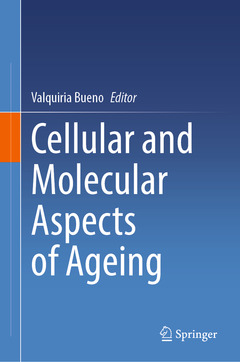Cellular and Molecular Aspects of Ageing, 1st ed. 2024
Coordonnateur : Bueno Valquiria

Even though life expectancy increased in the last decades, ageing has been considered a strong risk factor for age-related diseases, disability and death. The further understanding of cellular and molecular aspects of ageing could predict the onset of diseases in advance, prevent functional decline and identify targets for interventions focused in healthy ageing.
The hypothesis that organismal ageing and dysfunction is influenced by the accumulation of senescent cells had origin in Hayflick and Moorhead results from cultured human fibroblasts. It was shown that fibroblasts presented a limited capacity for proliferation reaching thus the state of irreversible growth arrest (replicative senescence). In 2011, van Deusen et al. showed that p16Ink4a accumulation was associated with premature ageing in a mouse model and the inactivation of the p16Ink4a gene mitigated the ageing phenotype. Thus, the cell cycle arrest due to the expression of p16Ink4a and p21CIP (cell cycle inhibitors) is the main characteristic of senescence. In addition to cellular senescence, the hallmarks of ageing include genomic instability, telomere shortening , epigenetic alterations, loss of proteostasis, deregulated nutrient-sensing, mitochondrial dysfunction, stem cell exhaustion, altered intercellular communication, and a pro-inflammatory senescence-associated secretory phenotype (SASP). In this book, researchers will comprehensively discuss relevant changes occurring at cellular and molecular levels (human and animal models) based on the hallmarks of ageing. The impact of lifestyle and benefits of physical activity and nutrition will be also discussed. Unravelling cellular and molecular aspects of ageing is crucial for the unanswered questions about ageing and for guiding interventions such as changes in lifestyle, senolytic (kills senescent cells), and senomorphic (interrupts deleterious intercellular communication) therapies.
1. Introduction: Daniela Frasca & Valquiria Bueno.- 2. Cellular Senescence: Laura Haynes.- 3. Genomic instability: Carlos López-Otín.- 4. Telomeres:Rodrigo do Tocantins C.S.Rodrigues.- 5. Epigenetic: Miriam Galvonas Jasiulionis.- 6. Proteostasis: Ana Maria Cuervo.- 7. Deregulated nutrient-sensing: Pedro Manoel M.M.Vieira.- 8. Mitochondria/Oxidative Stress: Tiago Rodrigues.- 9. Stem cell exhaustion: Michael D Milsom.- 10. Cell-to-cell communication: Ana O'Loghlen.- 11. Senescence-associated secretory phenotype (SASP): Janet M Lord.
Focuses on health ageing
Provides a comprehensive discussion of the hallmarks of ageing
Discusses life style, possible therapies, and clinical trials
Date de parution : 06-2024
15.5x23.5 cm
Disponible chez l'éditeur (délai d'approvisionnement : 15 jours).
Prix indicatif 179,34 €
Ajouter au panier


